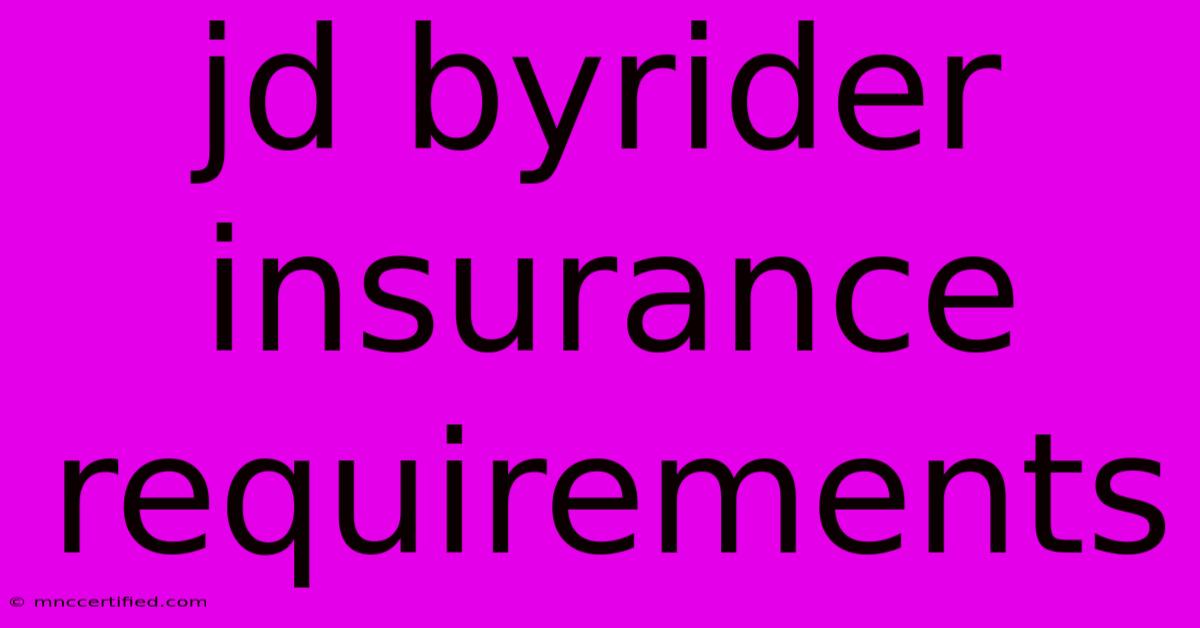Jd Byrider Insurance Requirements

Table of Contents
JD Byrider Insurance Requirements: A Comprehensive Guide
Buying a car from JD Byrider offers a pathway to vehicle ownership for those with less-than-perfect credit. However, understanding their insurance requirements is crucial before and after purchase. This comprehensive guide will clarify JD Byrider's insurance stipulations, helping you navigate the process smoothly.
Understanding JD Byrider's Insurance Policy
JD Byrider operates under a stringent insurance policy designed to protect both the buyer and the company's financial investment. They require full-coverage insurance on all vehicles financed through them. This isn't just liability; it includes collision and comprehensive coverage. This means you're covered for damages to your car in an accident (collision) and for non-accident damages like theft or weather-related harm (comprehensive).
This requirement isn't negotiable. Failing to maintain the required insurance coverage can lead to serious consequences, including repossession of your vehicle. JD Byrider regularly verifies insurance coverage, so keeping your policy active and compliant is paramount.
Key Insurance Aspects JD Byrider Demands:
- Full Coverage: This is non-negotiable. Liability-only insurance won't suffice.
- Named Insured: You must be explicitly named as the insured party on the policy.
- Proof of Insurance: JD Byrider will require proof of insurance, typically in the form of an insurance card or declaration page. Keep this readily accessible.
- Minimum Coverage Limits: While specific limits vary by state, JD Byrider will generally require coverage that meets or exceeds state minimums. Check your state's requirements and your JD Byrider contract.
- Regular Verification: Be prepared for periodic insurance checks. Proactive communication with your insurer and JD Byrider will prevent any issues.
Finding Affordable Insurance with JD Byrider
Securing full coverage insurance can seem daunting, especially if you have a less-than-perfect driving record or a lower credit score. However, several strategies can help you find affordable options:
- Shop Around: Compare quotes from multiple insurance providers. Don't settle for the first quote you receive.
- Bundle Policies: Combining your auto insurance with other policies, like homeowners or renters insurance, can often lead to discounts.
- Consider High Deductibles: A higher deductible will lower your premium, but remember you'll pay more out-of-pocket if you need to file a claim.
- Improve Your Driving Record: Maintaining a clean driving record is crucial for lower premiums.
- Explore Discounts: Many insurers offer discounts for safe drivers, good students, and those who complete defensive driving courses.
- Check for State Programs: Some states offer programs to help low-income individuals secure affordable auto insurance.
Consequences of Non-Compliance
Failing to maintain the required insurance coverage with JD Byrider can have severe repercussions:
- Repossession: This is the most significant consequence. JD Byrider has the right to repossess your vehicle if your insurance lapses.
- Late Fees: You might incur additional fees for failing to provide proof of insurance or maintain adequate coverage.
- Damage to Credit Score: Late payments or repossession will negatively impact your credit score, making it harder to obtain credit in the future.
Proactive Steps to Avoid Problems
- Maintain Consistent Contact: Keep your insurance provider and JD Byrider informed of any changes in your policy or contact information.
- Regular Policy Reviews: Review your insurance policy periodically to ensure it meets JD Byrider's requirements.
- Document Everything: Keep records of all your insurance documents, payments, and communications with JD Byrider.
By understanding JD Byrider's insurance requirements and taking proactive steps to maintain compliant coverage, you can protect your vehicle and your financial well-being. Remember, maintaining insurance is not merely a formality; it's a critical aspect of your agreement with JD Byrider. Always contact JD Byrider directly or consult your purchase agreement for specific details relevant to your situation and location. This information is for general guidance and should not substitute professional financial or legal advice.

Thank you for visiting our website wich cover about Jd Byrider Insurance Requirements. We hope the information provided has been useful to you. Feel free to contact us if you have any questions or need further assistance. See you next time and dont miss to bookmark.
Featured Posts
-
Grimmway Farms Recall Check Affected Products
Nov 19, 2024
-
Australia Wins 3rd T20 I Vs Pakistan
Nov 19, 2024
-
Poland Vs Scotland 1 2 Nations League Match
Nov 19, 2024
-
Pregnant Jennifer Lawrence Baby Bump
Nov 19, 2024
-
Does Chiropractors Take Insurance
Nov 19, 2024